Presumed guilty. Films reviewed: Mercy, A Private Life PLUS Canada’s Top Ten
Hi, this is Daniel Garber at the Movies for culturalmining.com and CIUT 89.5 FM.
This week, I’m talking about two new movies, both mysteries, about professionals forced to deal with crime that affects their personal lives. There’s a psychiatrist in Paris who uncovers a crime, and a police detective in LA blamed for a crime.
But before that I’m talking about a new series of Canadian films featured at TIFF in February.
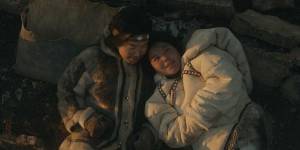 Canada’s Top Ten
Canada’s Top Ten
…is an annual series where programmers choose the best movies made in the previous year. While I haven’t seen all of them, a few really stand out. If you’re a regular listener to this show you may have heard my interviews last fall with Kid Koala about his  delightful futuristic animated kids’ film Space Cadet, and Inuit auteur Zacharias Kunuk’s amazing timeless folk tale Uiksaringitara (Wrong Husband), as well as my review of Matt Johnson’s hilarious, Nirvanna: the Band, the Show, the Movie. But let me tell you about a couple more that should not be missed.
delightful futuristic animated kids’ film Space Cadet, and Inuit auteur Zacharias Kunuk’s amazing timeless folk tale Uiksaringitara (Wrong Husband), as well as my review of Matt Johnson’s hilarious, Nirvanna: the Band, the Show, the Movie. But let me tell you about a couple more that should not be missed.
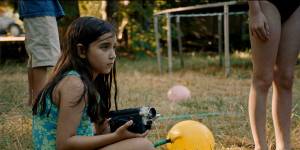 Blue Heron is director Sophy Romvari’s first feature. It’s about a young artistic couple and their kids who immigrate from Hungary to a small lakeside town in Canada. It’s seen through the eyes of a little girl whose troubled teenaged brother is “acting out”. It also picks up the story, and the characters’ lives, decades later. While it might sound like a mundane drama, it’s actually a heart-wrenching story of one troubled family.
Blue Heron is director Sophy Romvari’s first feature. It’s about a young artistic couple and their kids who immigrate from Hungary to a small lakeside town in Canada. It’s seen through the eyes of a little girl whose troubled teenaged brother is “acting out”. It also picks up the story, and the characters’ lives, decades later. While it might sound like a mundane drama, it’s actually a heart-wrenching story of one troubled family.
 And Mile End Kicks is Chandler Levack’s sophomore follow up to her quirky and tender I Like Movies in 2022. This one’s about a budding rock critic in 2011 Toronto, who sets off to discover Montreal with just a contract in her hand to write a book about Allan’s Morissette. This movie is brilliant and cringey and hilarious, a coming-of-age dramedy about a woman trying to survive within the male dominated world of rock.
And Mile End Kicks is Chandler Levack’s sophomore follow up to her quirky and tender I Like Movies in 2022. This one’s about a budding rock critic in 2011 Toronto, who sets off to discover Montreal with just a contract in her hand to write a book about Allan’s Morissette. This movie is brilliant and cringey and hilarious, a coming-of-age dramedy about a woman trying to survive within the male dominated world of rock.
These are just two of the movies you must check out at Canada’s Top Ten.
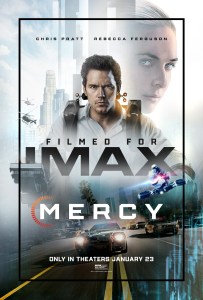 Mercy
Mercy
Dir: Timur Bekmambetov (Ben Hur)
It’s Los Angeles in the near future, and Chris Raven (Chris Pratt) is a real mess. He is bruised, battered and hungover from a drinking binge the night before… and has no recollection of the past 24 hours. He’s also in an unfamiliar place, a large, empty room, facing a giant video screen. He’s shackled to a chair with electronic instruments attached to his head. He is in the Mercy department, a new experimental court system, where a single person serves as the judge, jury… and executioner. That person is Judge Maddox (Rebecca Ferguson) a woman with straight hair and severe features. Why is Chris there? He’s been charged with first degree murder and has exactly 90 minutes to convince the judge that he’s not guilty beyond a reasonable doubt; if not, he will be executed in that chair. Oh! One more thing: Judge Maddox is actually a computer generated AI avatar, not a real human.
But Chris has a few cards up his sleeve. He’s a lieutenant police detective, so he knows all the legal procedures. Not only that, he and his partner created the Mercy system, so he knows all about it. But he never thought he’d be on the receiving end. Luckily, he has all the surveillance — CCTV, social networks, everyone’s cel phones and complete 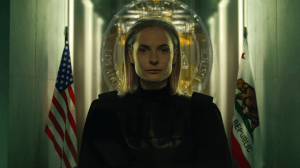 government, medical and legal histories — at his shackled fingertips. The bad news is, he seems to have motive, means and opportunity to do the killing, with no other obvious suspects. Can Chris Raven think his way out of this mess in the next 90 minutes? And can he put his destiny in the hands of a soulless, digital simulacrum?
government, medical and legal histories — at his shackled fingertips. The bad news is, he seems to have motive, means and opportunity to do the killing, with no other obvious suspects. Can Chris Raven think his way out of this mess in the next 90 minutes? And can he put his destiny in the hands of a soulless, digital simulacrum?
Mercy is a science-fiction police procedural where a falsely accused cop must solve a crime remotely in a very short period of time. It’s also a mystery/action thriller about a dystopian future where machines hold the final authority. The “thrilling” parts are all tied to a constant timed countdown on the screen — like the old TV series “24” — and a “rating” of guilt; a percentage that goes up and down depending on the evidence he presents to prove his innocence.
The problem with this movie is it feels like it was made on someone’s telephone. There’s virtually no physical interaction between any of the various characters throughout the film, just talking heads on the screen, reached by cel. I understand why they had to film movies like that during COVID, but what possible reason could there be for doing it now? I saw it in 3-D, but when all you see are smaller flat screens projected on to larger ones, what’s the point? On the plus side are the few scenes where Raven’s partner Jaq (Kali Reis) zooms around on her flying motorcycle, searching for the bad guys — that part was awesome! And my interest never wavers over the course of the movie. I like the constant countdown, and the steps they take to solve the mysteries. But what I thought would be a subversive Robocop-style indictment of both runaway government surveillance and the looming dangers of AI, instead ends up as a run-of-the-mill police story.
Mercy may hold your attention, but don’t expect anything more.
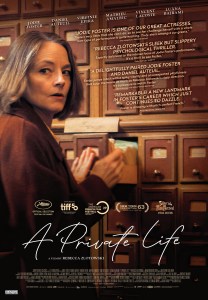 A Private Life
A Private Life
Dir: Rebecca Zlotowski
It’s a posh arrondissement in present-day Paris. Lilian Steiner (Jodie Foster) is a successful American Freudian psychotherapist who runs her practice all alone, in a clinic attached to her apartment. She has no trouble filling her roster with well-to-do patients seeking psychoanalysis. But recently, a number of bad things happen all at once. A new neighbour plays loud music during office hours, disturbing her clients. One longtime patient suddenly quits, calling her a fraud after he claims a hypnotist cured him of smoking in less than an hour. Another regular misses her appointments twice in a row without telling her — unheard of. Turns out Paula Cohen-Solal is dead, and when she shows up at her shiva, Paula’s husband Simon (Mathieu Amalric) loudly denounces Lilian as the reason his wife killed herself. This combination of events breaks down Lilian’s cool demeanour; to her horror, tears keep rolling down her cheeks at inappropriate times.
She visits her eye doctor — who happens to be her ex-husband Gabi (Daniel Auteuil) — to solve this medical dilemma. He says there are no physical reasons for her tears. So net she visits the hypnotist her angry patient told her about. She manages to stop her tears but, at the same time, lets loose a series of psychosexual dreams and visions of past lives that haunt Lilian’s mind. And she becomes convinced that Paula did not commit suicide but was murdered. And when she decides to investigate, someone breaks into her clinic and steals no money, just certain files. Who is behind the killing? Was there more than just a doctor/patient relationship between Paula and Lilian? And now that she and her ex- husband Gabi are spending time together again, could be this be the start of a new relationship?
husband Gabi are spending time together again, could be this be the start of a new relationship?
A Private Life is a mystery thriller set within the world of Parisian psychotherapy, it’s devotees, their families and their unspoken private lives. It’s presented in a low-key but ambiguous manner: you’re never quite sure whether a crime took place or even whether what you’re watching is real. It presents infidelity, hidden passions, and personal relations, alongside dreams, fantasies and psychological visions. Sort of a Murder She Wrote on mushrooms. Good acting by the large ensemble cast, especially Jodie Foster, Daniel Auteuil, Virginie Efira as the dead Paula and Sophie Guillemin as the enigmatic hypnotist.
While A Private Life didn’t blow me away, I quite enjoyed both the story and watching Jodie Foster complètement en français.
A Private Life and Mercy both open in Toronto this weekend; check your local listings. And tickets are now available for Canada’s Top Ten, showing at TIFF in February.
This is Daniel Garber at the Movies, each Saturday morning, on CIUT 89.5 FM and on my website culturalmining.com.
Kill, Pray, Dead? Films reviewed: All You Need is Kill, Dead Man’s Wire, The Testament of Ann Lee
Hi, this is Daniel Garber at the Movies for culturalmining.com and CIUT 89.5 FM.
This week, I’m looking at three great new movies with terrifying titles. There’s a religious leader giving her last will and testament, a hostage-taker with populist appeal, and a futuristic killer… who might save the planet.
 All You Need is Kill
All You Need is Kill
Co-Dir: Ken’ichirô Akimoto, Yukinori Nakamura
It’s the near future in a sparsely-populated, rural part of Japan. Rita (Ai Mikami) is a young woman waking up to another day. She has bright red hair in a pageboy haircut, with a jaded look on her face. She volunteers at a government project to care for the roots and branches of a giant plant. Exactly one year earlier, an enormous piece of vegetation — known as Darol — landed there from outer space and spread its tentacles for miles in all directions. The mother plant is a giant tower with colourful pointed leaves. It seems weird but harmless, and the volunteers, who wear helmeted space suits, scrub clean its enormous roots each day. Until today, when suddenly the plant spits out a small army of giant-legged flowers — like colourful daisies with hairy petals — resulting in mayhem,destruction and death. Only Rita fights back, killing one of the flowers before being overwhelmed by an intense wave of red light.
Next thing you know, she’s waking up in bed again as if nothing ever happened! Sure enough everyone else at work is alive and well, with no memories of the previous day. Was it just a dream? No, the daisy-monsters attack again, and 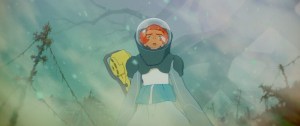 everybody — including Rita — dies. This repeats over and over, like a never-ending groundhog day. She tries to escape, tp hide, she trains herself on new fighting techniques she even climbs into an enormous metal exoskeleton… but she always dies in the end.
everybody — including Rita — dies. This repeats over and over, like a never-ending groundhog day. She tries to escape, tp hide, she trains herself on new fighting techniques she even climbs into an enormous metal exoskeleton… but she always dies in the end.
Life and resistance seem futile, with the red tentacles poised to colonize the earth. Until one day she spots a guy standing alone, observing her with a tiny, flying drone. She is angry and upset… until he tells her, he’s just like her, remembering each day too. And Rita is his hero. Keiji (Natsuki Hanae) is a geek who likes playing computer games and gazing at the stars, keeping himself far removed from danger. But together… can they defeat these awful killer daisies, and save the earth?
All You Need is Kill is an animated, science fiction fantasy, with a bit of unexpected romance thrown in. Based on a Japanese novella by Hiroshi Sakurazaka, it’s already been made into a Hollywood sci-fi action movie, Edge of Tomorrow with Tom Cruise… This one has a very different feel and a female lead. I like the noir mood, set against endless highways and deserted gas stations (rather than quaint Japanese towns). And I love the Rita character as the unflappable, existential heroine, full of nihilistic tendencies. But most of all, I love the art and animation, the colour blast of psychedelic images and cool settings.
All you Need is Kill is satisfying sci-fi anime, without any cheap AI gimmicks.
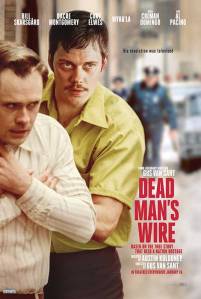 Dead Man’s Wire
Dead Man’s Wire
Dir: Gus Van Sant
It’s a cold winter day in Indianapolis in 1977. Tony Kiritsis (Bill Skarsgård: Nosferatu, The Crow, John Wick 4) is in a downtown high-rise. He has an appointment with the head of Meridian Mortgage, the bank he deals with. But M.L.
Hall (Al Pacino), the CEO, is not available: he’s in Florida, drinking cocktails and nibbling burritos. So the vice-president, ML’s son, Dick (Dacre Montgomery) says he’ll meet with him instead. But Tony has a bone to pick. A rather big one. He owned a plot of land he was going to turn into a shopping mall, until he was double-crossed by ML Hall, sabotaging his plans, ruining his life and swindling him out of his fortune. He wants revenge, restitution for the money he lost and a sincere apology. So he walks out of the building with a long gun wired to Dick Hall’s head (what’s known as a dead man’s wire). Any false move… kaboom!
But by this point, the cops have surrounded the building with snipers ready to kill. A cub reporter (Myha’la) who previously only did human interest stories, is there with her news van, scooping the story with eyewitness updates. And in the background is the smouldering Voice of Indianapolis (Coleman Domingo) on transistor and car radios everywhere. Tony manages to take Dick to his apartment, armed with  explosives, and release his demands. But can a regular guy take on a City Hall, a powerful bank and the police force… and survive?
explosives, and release his demands. But can a regular guy take on a City Hall, a powerful bank and the police force… and survive?
Dead Man’s Wire is a dramatization of a true event that gripped a city in the 1970s. There’s a definite Luigi Mangione feel to it, with a “I’m mad as hell and I’m not going to take it anymore!” vibe, of an ordinary person taking on a corrupt system. The acting is excellent. Bill Skarsgård — with his nervous moustache — wavers between funny and intense, Dacre Montgomery (he played Billy Hargrove in Stranger Things) transforms from terrified Dad to resigned hostage, and Al Pacino manages to convey the repulsiveness of his character in just a few minutes of screen time.
Gus Van Sant is one of the best American directors, but he hasn’t been making many movies — this is his first one in eight years. And though this is a true crime thriller, he aims toward character study rather than cheap, excitement. It’s a period piece and he gets that 1970s midwest urban feel spot on, but also feels oddly appropriate for right now.
And despite the provocative title, Dead Man’s Wire is probably the most laid-back, True Crime thriller you’ll ever see.
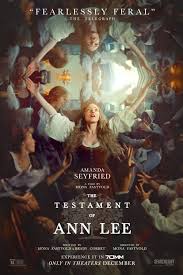 The Testament of Ann Lee
The Testament of Ann Lee
Co-Wri/Dir: Mona Fastvold (The World to Come)
It’s Manchester, England in the mid-18th century. Ann Lee (Amanda Seyfried: The Housemaid, Seven Veils, First Reformed, Gringo, Lovelace, Red Riding Hood) is a little girl living a miserable life. She sleeps in a room with a dozen others, including her parents having sex. Put to work in a factory at a very early age — there are no child labour laws — she receives virtually no schooling outside of religious lessons. But she goes out of her way to protect her even younger brother William (Lewis Pullman: The Stranger Prey at Night, The Starling Girl). She eventually marries, but despite repeated tries with her new husband Abraham (Christopher Abbott), all their children die as infants. She joins a new religion, starts preaching to a flock, and begins to gain followers. And though she is childless her devotees call her Mother Lee. After increasingly brutal persecution, she emigrates to the American colonies, alongside her brother and her flock (sponsored by a rich parishioner).
They are called the Shakers, for the ecstatic dancing that is 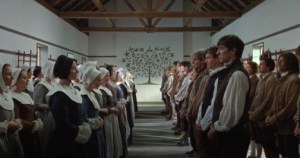 central to their religion. They force all sins from their bodies by expelling puffs of air even as they dance and writhe in a sexual-seeming way. They sing songs of joy and gratitude, hold egalitarian meetings and are similar to the Quakers, with one crucial difference: No more sex of any kind. Devotees are not born as Shakers they join them in their own free will. As popularity grows, they form colonies all across New England. They become known for their skillful carpentry (furniture made without nails or glue) weaving, and simple, pure lifestyles. Men and women are treated equally, and believe the Messiah will return in female form. But other sects brand them as witches and heretics, and start to attack them and burn down their places of worship. What will happen to Ann Lee and her followers in the new world?
central to their religion. They force all sins from their bodies by expelling puffs of air even as they dance and writhe in a sexual-seeming way. They sing songs of joy and gratitude, hold egalitarian meetings and are similar to the Quakers, with one crucial difference: No more sex of any kind. Devotees are not born as Shakers they join them in their own free will. As popularity grows, they form colonies all across New England. They become known for their skillful carpentry (furniture made without nails or glue) weaving, and simple, pure lifestyles. Men and women are treated equally, and believe the Messiah will return in female form. But other sects brand them as witches and heretics, and start to attack them and burn down their places of worship. What will happen to Ann Lee and her followers in the new world?
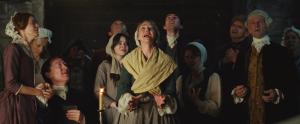 The Testament of Ann Lee is a sweeping, epic historical drama about the Shakers and their founder Ann Lee. It’s also musical, with characters breaking into religious songs and chants throughout the film. They dress in lovely white dresses, and dance in semi-orgasmic circles of ecstasy. The beauty of this story and richness of the characters is portrayed in visually, audibly and emotionally stunning ways. Even the fonts used in the credits are attractive. Which is not surprising, since Fastvold and her creative partner Brady Corbet brought us The Brutalist last year. One small quibble: Amanda Seyfried’s attempt at a Manchester accent. Which she more than made up for in her passionate — and enigmatic — portrayal of Ann Lee.
The Testament of Ann Lee is a sweeping, epic historical drama about the Shakers and their founder Ann Lee. It’s also musical, with characters breaking into religious songs and chants throughout the film. They dress in lovely white dresses, and dance in semi-orgasmic circles of ecstasy. The beauty of this story and richness of the characters is portrayed in visually, audibly and emotionally stunning ways. Even the fonts used in the credits are attractive. Which is not surprising, since Fastvold and her creative partner Brady Corbet brought us The Brutalist last year. One small quibble: Amanda Seyfried’s attempt at a Manchester accent. Which she more than made up for in her passionate — and enigmatic — portrayal of Ann Lee.
Highly informative and exquisitely crafted, The Testament of Ann Lee is definitely worth seeing.
The Testament of Ann Lee, Dead Man’s Wire and All You Need is Kill all open in Toronto this weekend; check your local listings.
This is Daniel Garber at the Movies, each Saturday morning, on CIUT 89.5 FM and on my website culturalmining.com.
Daniel Garber talks with Mascha Schilinski about Sound of Falling
 Hi, this is Daniel Garber at the Movies for culturalmining.com and CIUT 89.5 FM.
Hi, this is Daniel Garber at the Movies for culturalmining.com and CIUT 89.5 FM.
There’s an old farmhouse near a river somewhere in Northern Germany where Alma, a little girl with blonde hair plays practical jokes on her maid; adolescent Erika stares longingly at a naked man with one leg; a brash young Angelika asserts her sexuality even as she hides her pain; and naive Lenka navigates her parents’ new home. All of this in and around a looming, ancient farmhouse full of repressed memories of violence and trauma… but separated by generations: WWI in the 1910s, the end of WWII in the 1940s, in East Germany in the1980s and the present day. Each chapter punctuated by a terrible thud, the sound of falling.
Sound of Falling is a complex, intricate and powerful new movie, that looks at a century of life in rural Northern  Germany through the eyes of four girls and women, interweaving their separate stories throughout the entire film. It’s tender and horrifying, mundane and jaw-dropping. It’s co-written and directed by award-winning Berlin filmmaker Mascha Schilinski, her first feature after studying cinema at the Filmschule Hamburg and direction at the Film Academy Baden-Württemberg. Her movie won the prestigious Jury Prize at Cannes, played at TIFF and is on the 2026 Oscar shortlist for Best International Feature.
Germany through the eyes of four girls and women, interweaving their separate stories throughout the entire film. It’s tender and horrifying, mundane and jaw-dropping. It’s co-written and directed by award-winning Berlin filmmaker Mascha Schilinski, her first feature after studying cinema at the Filmschule Hamburg and direction at the Film Academy Baden-Württemberg. Her movie won the prestigious Jury Prize at Cannes, played at TIFF and is on the 2026 Oscar shortlist for Best International Feature.
I spoke with Mascha in Los Angeles via ZOOM.
Sound of Falling opens theatrically in Canada on January 23rd, 2026.
Different. Films reviewed: Father Mother Sister Brother, Primate, The Choral
Hi, this is Daniel Garber at the Movies for culturalmining.com and CIUT 89.5 FM.
This week I’m looking at three very different movies from diverse genres: historical drama, suspense horror, and an arthouse tryptic. There’s a choir in England, a killer chimp in Hawaii, and three sets of adults visiting their parents in the US, France and Ireland.
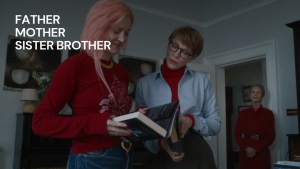 Father Mother Sister Brother
Father Mother Sister Brother
Wri/Dir: Jim Jarmusch (Only Livers Left Alive, Paterson)
Jeff (Adam Driver: Ferrari, White Noise, House of Gucci, Marriage Story, The Report, Black KKKlansman, Paterson, Hungry Hearts, ) and Emily (Mayim Bialik) are on a long road trip to visit their dad (Tom Waites: The Ballad of Buster Scruggs, The Old Man & the Gun ). They’re worried about him: his health, well-being and financial status, ever since their mom — his wife — died. Maybe he needs some money? He lives in a remote wooden house beside a frozen pond, somewhere in New England. But their annual visits are always short, awkward and perfunctory. Meanwhile, in Dublin, Ireland, two sisters Lilith (Vicky Krieps: The There Musketeers, Old ) and Timothea (Cate Blanchett: Black Bag, Borderlands, Tar, Nightmare Alley, Don’t Look Up, Stateless, Truth, Blue Jasmine, Hanna,) are visiting their Mom (Charlotte Rampling: Benedetta, The Sense of an Ending, 45 Years, ) for high tea. She lives in an elegant home where they meet once a year. But the adult daughters are too busy playing pranks and hiding secrets to pay much attention to their Mom’s petits fours. And sister and brother Skye and Billy (Indya Moore, Luka Sabbat) are paying a final visit to their late parents’ long-time flat in Paris after visiting the family storage locker. Can parents ever understand their kids? Are adult children really grow up? And can family dynamics  ever evolve past childhood?
ever evolve past childhood?
Father Mother Sister Brother is a triptych that looks at three sets of families in sequence: uptight, white-bread American sister-brothers with a cooler dad, eccentric sisters still terrified of their very chill mom, and hip Black-American sister-brothers from Paris whose much cooler parents recently died in an accident. The segments all share an unusual number of themes: Long drives, short visits, skateboarders on the street, discussions about water, whether a certain brand of wristwatch they’re wearing is real or counterfeit. So my immediate impression is it has great acting — Vicky Krieps, Tom Waits, Cate Blanchett, and Charlotte Rampling! I love Jarmusch’s distinctive style and wonderful cinematography, its visual and musical dynamics with a well-planned pace. But it’s way too repetitive to the point where it felt like an extended product-placement for Rolex. Once is cute, twice is funny, three times is just repetitive. But when I though about it some more, a week afterwards, I started to appreciate it as a baroque theme and variation, building on the original chapter but with slightly new twists each time. A slice-of-life from each family, put together to form a still life, a triptych.
Does it work? I’ll give it a qualified yes. It’s not my favourite Jim Jarmusch film, too long, too slow, too repetitive, but it does leave you with enough images to make it worth seeing.
 The Choral
The Choral
Dir: Nicholas Hytner
It’s a one-factory town in England during WWI. The local industrialist sponsors a chorus each year at Christmastime, there’s a noticeable dearth in participants with all the young men rushing off to join the army. Gone too is their chorus master. So they are forced to compromise and rehire someone controversial from their past, a certain Mr Guthrie (Ralph Fiennes: The Return, Conclave, A Bigger Splash). Though well- known in the music world, he carries a stain: he only recently returned from the Kaiser’s Germany, the enemy his country is fighting. The fact he had a male lover in Germany is also suspect but never spoken of. Another problem is what can they sing? All the local favourites are written by Bach, Brahms, Beethoven or Handel, Germans all. They decide to perform The Dream of Gerontius — an Oratorio by Elgar who A) is still alive, and B) still English.
Next they hold auditions and manage to find one returned soldier missing an arm, but with a angelic voice (Jacob Dudman), a young woman in the Salvation Army named Mary (Amara Okereke) whose notes are pure as the driven snow, and their benefactor — the industrialist — who sings an 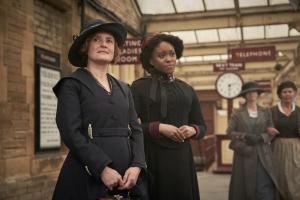 adequate baritone. But can the chorus be ready in time? And what will they do when Elgar himself shows up?
adequate baritone. But can the chorus be ready in time? And what will they do when Elgar himself shows up?
The Choral is a wonderful period drama about trying to put on a show despite all the hurdles in their way. With a large ensemble cast, it follows diverse storielines and covers wide ground: local prejudices, patriotism and hatred, first sexual experiences, love, valour, passion, rejection… and the dark cloud of war hanging over it all. I love the music, the acting,  cinematography, but the movie itself is even bigger than the sum of its parts. I think we owe that to the writer, Alan Bennett, and the director Nicholas Hytner. You may be familiar with their past collaborations on stage and screen: The History Boys, The Madness of King George, and The Old Lady in the Van, to name a few. Like them the Choral is once again both grand and intimate, dealing with heavy issues but always light and clever.
cinematography, but the movie itself is even bigger than the sum of its parts. I think we owe that to the writer, Alan Bennett, and the director Nicholas Hytner. You may be familiar with their past collaborations on stage and screen: The History Boys, The Madness of King George, and The Old Lady in the Van, to name a few. Like them the Choral is once again both grand and intimate, dealing with heavy issues but always light and clever.
I quite enjoyed this one.
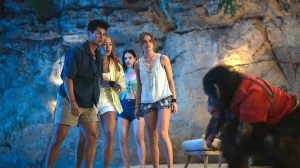 Primate
Primate
Co-Wri/Dir: Johannes Roberts (Resident Evil: Welcome to Raccoon City, The Strangers: Prey at Night)
It’s another perfect day in Hawaii, and Lucy (Johnny Sequoyah) is really happy to be flying home again. Yes, she likes going to college but she also misses her family and home in Hawaii. Her late mom was a linguist who worked with apes in the style of Jane Goodall. And their dad (Troy Kotsur), is a bestselling author who was born deaf. So she and her shy little sister grew up speaking American Sign Language with their dad and another sign-and-spoken language with the chimpanzee Ben, who, though he sleeps in his own caged enclosure, is almost considered a part of their family. Coming home with her are her BFF Kate (Victoria Wyant), Kate’s brother Nick (Benjamin Cheng) who Lucy has a secret crush on, her frenemy Hannah (Jess Alexander), and a pair of himbos Hannah was hitting on aboard the plane.
And, as luck would have it, their dad is going away for a day to do some book signings, so they have the home — a multilevel glass- walled, playground with a stucco, lunar-landscape tunnel that leads to the backyard, and an Infiniti pool by the edge of a cliff — all to themselves. Which means it’s time to par-tay! They light up their pre-rolls and pop open their beers and start having fun.
But that’s when things go bad. Ben, the chimpanzee has rabies and is going ape-crazy, attacking and maybe even killing some of these college kids. Dad is far away, and all seven of them have misplaced their cel phones! Oh no! What can they do? Who will survive this murderous ape?
Primate is a suspense thriller/horror about college kids vs a 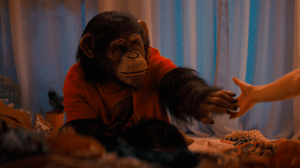 killer chimp. It’s stupid-funny and basically plotless — just how to survive this rabid monkey till someone calls 9-1-1 — but it is fun. Lots of surprises, with the ominous chimp (still dressed in brightly-coloured kids clothes) swinging from the rafters, breaking through windows and, you know, killing people.
killer chimp. It’s stupid-funny and basically plotless — just how to survive this rabid monkey till someone calls 9-1-1 — but it is fun. Lots of surprises, with the ominous chimp (still dressed in brightly-coloured kids clothes) swinging from the rafters, breaking through windows and, you know, killing people.
Personally, I found the goriness unnecessary — I don’t like watching people’s faces getting torn off — but I guess gorno is part of its horror appeal. And lest you think I’m spoiling it, the movie tells you about rabies before the first line is spoken, and Ben peels the skin off someone’s face in the first five minutes, so I’m not telling you anything they didn’t already want you to know.
Yes, it’s super-simplistic, and breaks down logically very quickly, but as a movie, it pushes all the right buttons.
Primate, The Choral and Father Mother Sister Brother all open in Toronto this weekend; check your local listings.
This is Daniel Garber at the Movies, each Saturday morning, on CIUT 89.5 FM and on my website culturalmining.com.
Best movies of 2025! PLUS: Rosemead, We Bury the Dead,
Hi, this is Daniel Garber at the Movies for culturalmining.com and CIUT 89.5 FM.
It’s a new year, the perfect time for me to look back at the best of last year’s movies. What do I look for? Films that are novel, funny, scary, sexy, shocking, and emotionally or intellectually engaging. And just really well made. And because of limited space, I’m not including documentaries — like Laura Poitras’s Cover Up or Baz Luhrmann’s dazzling EPiC: Elvis Presley in Concert— nor animation, though I loved Seth and Peter Scriver’s Endless Cookie, or the wonderful French movie Arco. So here are my favourite movies of 2025.
But first, I’m looking at two new movies opening this weekend and next. There’s a zombie apocalypse in Tasmania, and a mom and son drama in LA .
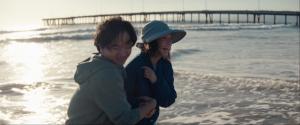 Rosemead
Rosemead
Co-Wri/Dir: Eric Lin
Irene (Lucy Liu) is a middle aged woman and single mom who runs her own printing shop in an LA strip mall. She’s bringing up her only child, Joe (Lawrence Shou). Joe was a top student and athlete (he’s on the school swim team) with a bright future. But when his dad suddenly died he fell into a deep funk. Now he spends most of his days scratching creepy ink drawings of spiders and corpses in his notebooks. He is seeing a therapist to help him recover, but it doesn’t seem to be doing much good. Irene, meanwhile, has problems of her own. She has cancer, and is being treatment with some new, experimental medicines, since nothing has worked in the past. Though she’s frequently coughing up blood, she tells Joe everything is going fine. She doesn’t him to have to worry about her, too.
But Joe keeps getting worse, obsessing over mass shootings in American schools. Though his best friends are trying to help, things look grim. He has a breakdown in class when they do a armed intruder exercise. Irene finds links to gun images on his computer. And then he disappears entirely, running away from home just  weeks before his 18th birthday. Can Irene find Joe and keep him safe? And what will he do if her chemo is unsuccessful?
weeks before his 18th birthday. Can Irene find Joe and keep him safe? And what will he do if her chemo is unsuccessful?
Rosemead is a character study of a mom and her son dealing with medical and mental health issues.
No spoilers, but the film is inspired by a true event, that made the headlines. The usually glamourous Lucy Liu plays a frumpy mom who speaks only broken English and Chinese, as she deals with her very real pain. (Her story takes place mainly within LA’s Chinese community) Lawrence Shou is also sympathetic as a teenager dealing with a sudden onset of schizophrenia. Though more grim than heart-lifting, Rosemead is a moving, real-life drama.
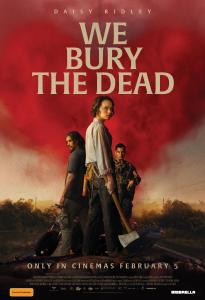 We Bury the Dead
We Bury the Dead
Wri/Dir: Zak Hilditch
It’s present-day Tasmania, Australia. Ava (Daisy Ridley) is a recently- married young professional in the US. She has just arrived in Tasmania’s capital, Hobart, to look for her husband. He went there a week earlier for a business retreat but never came back. The reason is catastrophic.The US military has been testing weapons of mass destruction in the south Pacific, and one, a secret bomb that uses electromagnetic pulses, accidentally explodes, wiping out every last man, woman and child in Tasmania.
So a number of volunteers, including Ava, arrive there to help clean up and bury the bodies. The Australian military provides direction: the lands south of Hobart are strictly off-limits. Ava is teamed up with a scruffy ne’er-do-well named Clay (Brenton Thwaites) who is rather loose with his axe. He seems to like smashing windows more than burying bodies. Ava has a second motive. She wants to find and bury her husband; she needs the closure that would bring (he flew off to Australia at a crucial point in their relationship.) But the resort he had been staying in was in Woodbridge, a town far south of Hobart. So when they come across an illicit drug dealer’s shiny motorcycle, Ava manages to convince Clay to secretly drive her south to find her husband. But wait! There’s more. Among all the dead bodies a small percentage are coming back to life. And the  army has orders to wipe them all out. Are they humans or zombies? How can Ava and Clay deal with them? And will she ever find her husband? And what will happen if soldiers catch them out of the zone?
army has orders to wipe them all out. Are they humans or zombies? How can Ava and Clay deal with them? And will she ever find her husband? And what will happen if soldiers catch them out of the zone?
We Bury the Dead is a speculative drama about marriage and relationships in the face of a potential zombie apocalypse. Australians have shown an amazing talent for the scary and grotesque, in movies like Talk To Me. But it’s not really a horror movie. There’s some good acting, an interesting post-apocalyptic storyline, and beautiful scenery. But although there are some scary parts, these zombies don’y seem that hazardous. Yeah, their eyes are pus-y and they clack their teeth together with a very unnerving sound… but they move slowly and don’t eat brains. So if you’re mainly looking for zombie-scares, I think you should look elsewhere.
Here are my favourite films of 2025
In alphabetical order:
Christy — this is a biopic about a lesbian female boxer and her abusive husband/manager.This was a collossal flop but I thought it was a great sports melodrama with over-the-top performances by Sidney Sweeney and Ben Foster.
Eddington
Another flop that many viewers and critics hated, but I think Ari Aster has given us a stunning microcosm of contemporary American politics — starring Joachim Phoenix as the police chief and Pedro Pascal as the Mayor of a small New Mexico town.
Frankenstein
This is Guillermo del Toro’s totally original retelling of the gothic horror classic, starring Oscar Isaac as the mad scientist and Jacob Elordi as his gentle monster.
Hamnet is a lovely fictionalized version of two parents — William Shakespeare and his wife Agnes (Played by Jesse Buckley and Paul Mescul) — dealing with the death of their son. A genuine tearjerker.
I Swear
Is a touching and hilarious biopic about a man in Scotland dealing with Tourette’s syndrome.
Marty Supreme
…is a frenetic and chaotic look at a champion pingpong player in the 1950s, portrayed as a charming yet infuriating character by Timothy Chalamet, in this whirlwind of a movie.
The Mastermind
Cinematic master Kelly Reichardt’s latest drama about a would-be art-thief turned underground fugitive in the 1970s. Josh O’Connor stars in this diverse ensemble.
Nirvanna, The Band, The Show, The Movie
The infuriating but hilarious Matt Johnson and the even headed Jay McCarrol bring us this mind-boggling back-to-the-future story about a failed Toronto band and its obsessed leader, willing to travel back in time to find success.
Secret Agent
Is an engrossing and surprising political mystery/thriller set during the military dictatorship in Brazil that stars Wagner Moura as a dissident forced to flee to Reciffe to keep his son, and himself, safe.
Sinners
Is a spectacular horror set in the American deep south that combines black music with monsters. It stars Michael B Jordan as twin brother musicians who open a juke joint in a county swarming with both Vampires and the KKK.
Sirat
Is a mind-blowing road movie about an ordinary Spanish dad and his young son who follows a caravan of ravers and freaks through the western Sahara as he searches for his daughter.
One Battle After Another
Loosely based on a book by Thomas Pynchon, Paul Thomas Anderson’s this political satire looks at a former underground revolutionary cel brought back to life in contemporary California. It stars Leonardo Dicaprio, Sean Penn and Teyana Taylor.
Runners up:
Girl/Left-Handed Girl
Both Taiawanese coming-of-age stories about a young girl growing up in Taipei.
Wake Up Dead Man
Rian Johnson’s brilliant locked-room murder mystery set within a renegade Catholic Church.
Weapons
A truly original horror story.
Bring Her Back
Another horror, this one from Australia, is very disturbing.
The Testament of Ann Lee
A musical biopic about the start of the Shakers, an ecstatic American sect in the 18th and 19th century that forbade all sexual contact.
Meadowlarks
A deeply moving drama about the tentative reunion of an indigenous family’s brothers and sisters who were forceably separated for decades by the Sixties’ Scoop.
Friendship
A cringe comedy starring Tim Robinson and Paul Rudd.
The History of Sound
An historical drama about two ethnomusicologists who find fleeting love while collecting music in early 20th century America.
Orphan
Oscar-winner László Nemes ’s heart-wrenching drama about his own father’s life in 1950s Budapest.
Sorry Baby
Writer /director/ actor Eva Victor retelling — with a dark sense of humour — of a terrible incident in her own life as a New England grad student.
Bury the Dead opens this weekend, and Rosemead next week in Toronto; check your local listings. And all of my Best Movies Of 2025 are playing theatrically, digitally or are coming soon.
This is Daniel Garber at the Movies, each Saturday morning, on CIUT 89.5 FM and on my website culturalmining.com.
Bums in seats. Films reviewed: The Housemaid, Avatar: Fire and Ash
Hi, this is Daniel Garber at the Movies for culturalmining.com and CIUT 89.5 FM.
It’s holiday time, so now’s when you watch the blockbusters and big studio releases. Don’t worry, I’ll be talking about lots more art house and indie movies in January, but for now here’s some more schlock to keep you in the theatres: “bums in seats”. This week I’m talking about two new movies: a new maid working in a mysterious mansion, and giant cat people fighting off humans on a distant planet.
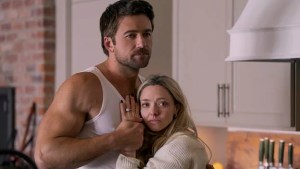 The Housemaid
The Housemaid
Dir: Paul Feig
Millie (Sydney Sweeney) is a young woman in her twenties looking for a job in Teaneck, New Jersey. Smart, pretty, and hard-working, she’s willing to do almost anything. So when she’s offered a vague position by the Winchesters, a very rich family, she jumps at the chance. She’s homeless and on parole, with five years left to her sentence (a fact she conveniently left out of her application.) What’s the job? Sort of a “Jane of all trades: cook, maid, janitor, personal assistant, and nanny for their daughter, a spoiled and bossy 8-year-old named Ceecee (Indiana Elle). She’s hired by the reserved but lovely Nina (Amanda Seyfried). Her husband Andrew Winchester (Brandon Sklenar) is a tech bro, and heir to a vast family fortune. Millie is given a private room at the top of a steep staircase, a garret with slanted walls and a small, barred window.
But after a few days, the drawbacks of this job begin to reveal themselves. Nina is given to increasingly violent outbursts, blaming all her problems on the newly hired Millie. And the handsome and buff Andrew seems to show up half dressed to flirt whenever Millie is alone, making Nina’s intense jealousy seem less irrational. She overhears the rich housewives of Teaneck who say Nina has lost her marbles.So Millie is stuck between a rock and a hard place. Nina keeps gaslighting her, setting her up for impossible situations. If she’s fired she’ll be sent back to jail. But she also secretly lusts for Andrew, if even for one night. Should she placate Nina, fend off 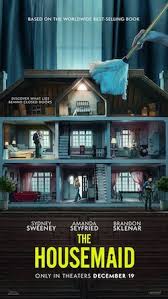 Andrew’s advances, or throw caution to the wind? And what are the backstories these three people keep tucked away?
Andrew’s advances, or throw caution to the wind? And what are the backstories these three people keep tucked away?
The Housemaid (based on the bestselling novel by Freida McFadden), is a suspense thriller with a psycho-sexual subplot. It has lots of sex, violence and intrigue, but told in a kitschy style, like a steamy late-night telenovela. While Seyfried is way over the top Sweeney seems more reserved, though there are eventual reasons for their weird behaviours (no spoilers.) But even the plot twists — and there are a lot of them — are laughable. And the side characters — like Enzo, the silently, lurking gardener — are there mainly for guffaws. Don’t look for any highbrow meaning here — it’s pure cheese — but The Housemaid is still craptastically watchable.
![]() Avatar, Fire and Ash
Avatar, Fire and Ash
Co-Wri/Dir: James Cameron
It’s the future on Pandora, a far-off planet populated by cat-like humanoids with blue or green skin and long tails. They have always lived in harmony with nature, until the arrival of the Sky People, aka earthlings. Having ruined the Earth, humans want to colonize Pandora for the lucrative whale trade. But in order to breathe there, humans — specifically the US Marine Corps — need a mask, making it difficult to take over the planet. So they use avatars, instead: human memories and identities transferred into the bodies of the Na’vi, as the locals are known. Now, years later, one avatar named Jake (Sam Worthington) has blended in with the locals, marrying and raising a family, while leaving his days as a Marine far behind. Until now. The sky people are back with a vengeance: they plan on killing all the whales — along with countless Na’vi casualties — and ruining yet another planet.
Fortunately, Jake and his family — his wife Neytiri (Zoe Saldaña), Loak his son (Britain Dalton) Kiri his magical daughter (Sigourney Weaver) and a friend of theirs, Spider (Jack Champion) a blond American with dreadlocks, all agree that the Sky People must be stopped. Unfortunately, Col. Quaritch (Stephen Lang) another avatar soldier (and Jake’s former ranking officer) wants to stop the Na’vi at all costs. And when he teams up with a devil-worshipping cult, led by the scary Varang (Oona Chaplin), offering weapons in exchange for soldiers, it looks like the humans will triumph once again. Is there still a chance to save Pandora?
Avatar: Fire and Ash is the third (and last?) in a series of 3D animated movies, directed by James Cameron (2009, 2023). It’s a somewhat messy combination of science fiction, action, romance, and spirituality told from an ecological viewpoint. It’s extremely long (3 1/4 hours!) to cover dozens of sub plots and characters carrying over from the previous movies. I saw the other two but only vaguely remember the storylines. I have no deep devotion to the Avatar universe, any more than I do to Lord of the Rings, Star Wars or Marvel comics. I do like the style though and find the creatures cool: 15 feet tall with lithe blue tattooed bodies — the women have![]() macrame hemp bikini tops artfully draped over their torsos — and they fly around on tamed pterodactyls. What’s not to like? And there are parts that I found quite moving. That said it’s way, way, way, way, way too long. They could easily have covered everything in half the time. I guess no one told Cameron to cut stuff out. If you’re an Avatar devotee, I think you’ll like it. But if you’re an Avatar virgin, don’t start with this one — it’s just too much to take in.
macrame hemp bikini tops artfully draped over their torsos — and they fly around on tamed pterodactyls. What’s not to like? And there are parts that I found quite moving. That said it’s way, way, way, way, way too long. They could easily have covered everything in half the time. I guess no one told Cameron to cut stuff out. If you’re an Avatar devotee, I think you’ll like it. But if you’re an Avatar virgin, don’t start with this one — it’s just too much to take in.
The Housemaid and Avatar Fire and Ash are now playing in Toronto; check your local listings.
This is Daniel Garber at the Movies, each Saturday morning, on CIUT 89.5 FM and on my website culturalmining.com.
Ambition. Films reviewed: The SpongeBob Movie: Search for SquarePants, Song Sung Blue, Marty Supreme
Hi, this is Daniel Garber at the Movies for culturalmining.com and CIUT 89.5 FM.
Some people are driven, willing to risk life and limb to reach their final goals. So this week I’m looking at three new movies about ambitious people. There’s an athlete who wants to conquer the world using pingpong balls, a pair of tribute singer who finds love on the music circuit, and a porous sea creature who just wants to be a swashbuckler.
 The SpongeBob Movie: Search for Squarepants
The SpongeBob Movie: Search for Squarepants
Dir: Derek Drymon
SpongeBob SquarePants is a creature who lives under the sea in a town called Bikini Bottom. He has an adult job (he works as a fry cook) but acts more like a child. And like most kids, he wakes up one day to discover he’s grown taller, just tall enough to be allowed to ride the roller coaster at the local midway. He has always want to do it, so he sets off with his much taller best friend Patrick, a starfish, to fulfil his dream. But when he gets to the front of the line he is so overwhelmed by fear and anxiety, he turns around and runs away. He admits what happened to his boss, Mr Krebs, who tells him about his own experience facing fear head-on. You must overcome your fears by exhibiting bravery in the face of  danger. Only then can you be considered a true swashbuckler.
danger. Only then can you be considered a true swashbuckler.
Soon afterwards, SpongeBob and Patrick meet an evil pirate’s ghost known as the Flying Dutchman, who offers to guide SpongeBob through a series of tasks so he can get the coveted Swashbuckler’s certificate. Being young and naïve, he follow the ghost into the underworld. But the older and wiser Mr. Krebs realizes SpongeBob is in danger so he drives after them on his quest. Will SpongeBob become a Big Boy? Or will he always be a bubble-blowing baby? And when will he realize the Flying Dutchman is up to no good?
The SpongeBob Movie: Search for SquarePants is the latest in a series of films, adapted from the wildly popular TV cartoon. It features the usual voices: Tom Kenny as SpongeBob, Bill Fagerbakke as Patrick Star, Clancy Brown as Mr Krabs and Rodger Bumpass as Squidward, and guest-starring Mark Hamill as the Flying Dutchman. The theme this time is everything pirate: a parrot, Davy Jones Locker, hornpipe, spyglass, three cornered hats… you get the picture. While you could call this a coming-of-age drama, that might be pushing it, because cartoon characters never really change or grow up.The look of this movie and its animation style is different from the largely two- dimensional TV show, more cinematic and less cartoony. (I prefer the flatter look to these 3D images.) But it’s nice to watch and quite funny in parts. Like  when Patrick turns his pirate eyepatch into a g-string presumably to conceal his non-existent starfish private parts. Other jokes can only be appreciated by the 3-5- year-old set, like repeating the same words over and over and over and over again until it turns into something marginally salacious.
when Patrick turns his pirate eyepatch into a g-string presumably to conceal his non-existent starfish private parts. Other jokes can only be appreciated by the 3-5- year-old set, like repeating the same words over and over and over and over again until it turns into something marginally salacious.
If you want to entertain your own Ritalin-fuelled psyche — or that of your kids — you’ll probably like this one.
 Song Sung Blue
Song Sung Blue
Co-Wri/Dir: Craig Brewer (reviews: Dolemite is My Name, Footloose)
It’s the 1990s in Milwaukee, Wisconsin. Mike, aka Lightning (Hugh Jackman) is a professional musician who plays back-up for a Black R&B band. He once had his own group, but now he mainly earns a living doing tributes to washed out singers from decades past. But he is fired from the show when he refuses to dress up as Don Ho, when the usual singer doesn’t show up.
But something else happens that night: he meets Claire (Kate Hudson) who performs Patsy Cline songs. Sparks fly, and soon they’re a couple with a blended family; they both have kids from previous marriages. And they form an act, called Thunder and Lightning, where the two of them exclusively sing songs by Neil Diamond. They build up a fanbase and eventually are the opening act for Pearl Jam!
Looks like they finally made… until a series of unmitigated disasters threaten both of their lives. Can their love, family and music keep them together?
Song Sung Blue is a romantic biopic about a largely unknown musical duo and their fascinating lives. It’s three main themes are love, family and nostalgia. The love is evident: the two leads have real chemistry. Kate Hudson does a very convincing Wisconsin accent, while Aussie Hugh Jackman sticks to a more of a generic American voice. Can they sing? Totally! They’re both good singers. The family parts are warm and convincing, as are the three kids. As for nostalgia, this is a case of people in 2025 longing for some good ol’ 1990’s nostalgia for the legendary 60s and 70s. So many layers, it’s like a nostalgic club sandwich. As for the tone, while this is not a Christian, faith-based movie, it has the same family-goodness-feel to it. Then there’s the music. Face it, Neil Diamond songs were never subversive or rock ’n’ roll; they’re about as mainstream as you can get… but with catchy tunes and memorable lyrics. People seem to love it.
musical duo and their fascinating lives. It’s three main themes are love, family and nostalgia. The love is evident: the two leads have real chemistry. Kate Hudson does a very convincing Wisconsin accent, while Aussie Hugh Jackman sticks to a more of a generic American voice. Can they sing? Totally! They’re both good singers. The family parts are warm and convincing, as are the three kids. As for nostalgia, this is a case of people in 2025 longing for some good ol’ 1990’s nostalgia for the legendary 60s and 70s. So many layers, it’s like a nostalgic club sandwich. As for the tone, while this is not a Christian, faith-based movie, it has the same family-goodness-feel to it. Then there’s the music. Face it, Neil Diamond songs were never subversive or rock ’n’ roll; they’re about as mainstream as you can get… but with catchy tunes and memorable lyrics. People seem to love it.
Song Sung Blue is a cozy, cheesy movie with lots of tearjerking moments thrown in. I thoroughly enjoyed it, despite myself.
 Marty Supreme
Marty Supreme
Co-Wri/Dir: Josh Safdie
It’s the early 1950s in postwar NY City. Marty Mauser (Timothée Chalamet) is an extremely ambitious man in his twenties, who wants to be rich and famous, but who still lives in a tenement with his mom (Fran Drescher) and works at his uncle’s shoe store. He’s simultaneously charming, brash and audacious. He’s also secretly schtupping Rachel, the married woman who lives downstairs (Odessa A’zion). So what’s his ticket to fame and fortune? Pingpong. He’s a top player who jumps and dives with his paddle like an athletic ballet dancer. Table tennis lacks mainstream acceptance as a serious sport but he plans to change all that. Step one: to secure a plane ticket to London to win the world championship. But that’s not all. He’s looking for a sponsor to invest in his Marty Supreme brand pingpong balls. He also tries to seduce a faded but glamorous Hollywood star (Gwyneth Paltrow) at least twice his age and married to a rich industrialist. And somehow he finds himself part of a scheme with his pal Wally (Tyler the Creator) to bilk rubes n New Jersey as a ping pong ringer. And a side hustle 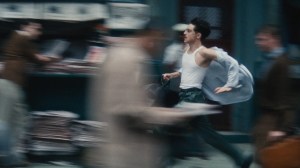 taking care of a vicious mobster (Abel Ferrara)’s shaggy dog. But the gangster’s pet is dognapped, Rachel reveals she’s pregnant and lots of people now want to see Marty dead. Can he escape all his troubles and follow his dream? Or is he destined to be a shoe salesman forever?
taking care of a vicious mobster (Abel Ferrara)’s shaggy dog. But the gangster’s pet is dognapped, Rachel reveals she’s pregnant and lots of people now want to see Marty dead. Can he escape all his troubles and follow his dream? Or is he destined to be a shoe salesman forever?
Marty Supreme is a stupefyingly good movie about a working class hero in mid-century America. It’s funny, constantly surprising and full of thrills, sex, and screwball-comedy violence. It’s frenetic and chaotic. Marty Mauser is a fictionalized version of Marty Reisman, a real athlete who chalked up pingpong tournament wins for half a century. Writer/director Josh Safdie is one of the Safdie brothers; they made Uncut Gems and Good Time together. This one is by far the best. It has a cast of thousands — Chalamet, A’Zion and  Paltrow are all great, but so are the smaller roles, like Piko Iyer,
Paltrow are all great, but so are the smaller roles, like Piko Iyer,
Emory Cohen, Géza Röhrig and Koto Kawaguchi, to name just a few. And it wasn’t till the credits rolled that I realized the villainous, Kevin O’Leary-type industrialist was actually played by O’Leary himself. There’s just so much going on — US occupied Japan, the Harlem Globetrotters — it never ceases to amaze. And putting an 80s pop soundtrack into a 1950s story is a stroke of genius.
Marty Supreme is one hell of a good movie.
Song Sung Blue, The SpongeBob Movie: Search for SquarePants, and Marty Supreme all open in Toronto on Christmas Eve; check your local listings.
This is Daniel Garber at the Movies, each Saturday morning, on CIUT 89.5 FM and on my website culturalmining.com.
Bad Hombres. Films reviewed: Silent Night, Deadly Night, Dust Bunny, One Battle After Another
Hi, this is Daniel Garber at the Movies for culturalmining.com and CIUT 89.5 FM.
It’s easy to root for heroes with clean-scrubbed cheeks and virtuous demeanours, but they make for boring movies. Much more challenging are films where the main characters are anti-heroes, fatally flawed and yet still compelling.
So this week I’m looking at three movies featuring sympathetic portrayals of bad hombres. There’s a murderous Santa Claus, a retired revolutionary, and a monster who lives under your bed.
 Silent Night, Deadly Night
Silent Night, Deadly Night
Wri/Dir: Mike P. Nelson
It’s Christmastime and like every year Billy Chapman (Rohan Campbell: Halloween Ends) is on the road again. He’s a drifter in his early 20s, picking up work wherever he can find it. He ends up in a small town, and finds work in a store specializing in Christmas ornaments and memorabilia. He forms a crush on Pamela (Ruby Modine), the young woman who runs the store with her dad. But this place is doubly significant because Christmas is crucial to Billy’s self-identity. You see, when he was just a child, he witnessed his parents brutally murdered by a man dressed as Santa Claus. And now he has taken on that role for himself. Dressed in a Santa suit and wielding an axe, Billy kills one person per day, following his advent calendar, until Christmas.
So is Billy a psychopathic serial killer? Well, yes… but, like Santa, he punishes naughty people but lets good ones have a merry Christmas. Everyone he murders is bad… real bad. And how does he know this? A voice in his head tells him who to kill. But things change when he finds himself falling in love with Pamela. And the feelings seem mutual; they somehow click. (She has Explosive Personality Disorder, sort of like his murder sprees only much less violent). Billy thinks it’s time to settle down, maybe give up all the killing. Can Billy ignore the nagging voice in his head? What will happen if he stops killing bad people? And how will Pamela react if she ever finds out the truth about Billy?
kill. But things change when he finds himself falling in love with Pamela. And the feelings seem mutual; they somehow click. (She has Explosive Personality Disorder, sort of like his murder sprees only much less violent). Billy thinks it’s time to settle down, maybe give up all the killing. Can Billy ignore the nagging voice in his head? What will happen if he stops killing bad people? And how will Pamela react if she ever finds out the truth about Billy?
 Silent Night, Deadly Night is a classic, slasher-horror Christmas movie about a young killer Santa. It’s ostensibly a remake of an 80s film of the same name (and its sequels) but updated to fit our times. It’s bloody, violent and sometimes disgusting but always in a funny, retro-camp style. I’m talking red & black freeze frames, and old-school soundtrack. And it’s shot in Manitoba, complete with hockey games and lumber yards. Ruby Modine is hilarious as Pamela, and Rohan Campbell manages to make his serial-killer Santa almost sympathetic.
Silent Night, Deadly Night is a classic, slasher-horror Christmas movie about a young killer Santa. It’s ostensibly a remake of an 80s film of the same name (and its sequels) but updated to fit our times. It’s bloody, violent and sometimes disgusting but always in a funny, retro-camp style. I’m talking red & black freeze frames, and old-school soundtrack. And it’s shot in Manitoba, complete with hockey games and lumber yards. Ruby Modine is hilarious as Pamela, and Rohan Campbell manages to make his serial-killer Santa almost sympathetic.
Not your typical Christmas flick but if you’re looking for a funny, gross-out slasher, you can’t go wrong with Silent Night, Deadly Night.
 Dust Bunny
Dust Bunny
Wri/Dir: Bryan Fuller
Aurora (Sophie Sloan) is a little girl who lives in a beautiful, antiquated apartment in an unnamed city. She is brave and resourceful with a wild imagination. Aurora has all the clothes, toys and games any girl could ever want. So why is she always so frightened? Because there’s something scary under her bed that won’t go away. It’s a dangerous monster that lives beneath her parquet floorboards, and she’s convinced he’ll eat you up if you ever step on the floor at night. So she gets around on a wooden hippo with wheels, using her mop as a paddle. Her parents tell her repeatedly that there’s nothing under her bed, just dust bunnies, but Aurora refuses to listen. She ends up sleeping on her outdoor fire escape to keep ahead of the monsters. One night she follows a stranger down a dark ally, where she witnesses him slaughtering a dragon. Here’s someone who can keep her safe from the monster — and he lives in her building! When her parents disappear one night she knows she needs help to stay alive. So she attempts to hire her downstairs neighbour (Mads Mikkelsen: The Promised Land, Indiana Jones and the Dial of Destiny, Riders of Justice, Another Round, The Hunt) as a hitman, to kill the monster hiding beneath her bed.
Problem is he doesn’t believe in monsters; he thinks someone was sent to get him, and killed her parents by mistake. But in the end, he agrees to help her. This news gets her boss very angry. Uptight and evil Laverne (Sigourney Weaver) wants Aurora dead, since she witnessed one of his assignments (he’s a professional hired killer). Soon others start appearing at her door including a suspicious guy with a moustache (David Dastmalchian) and a dressed-to-kill social worker (Sheila Atim). Who are all these people really? And will no-one listen to Aurora about the monster under her bed?
the end, he agrees to help her. This news gets her boss very angry. Uptight and evil Laverne (Sigourney Weaver) wants Aurora dead, since she witnessed one of his assignments (he’s a professional hired killer). Soon others start appearing at her door including a suspicious guy with a moustache (David Dastmalchian) and a dressed-to-kill social worker (Sheila Atim). Who are all these people really? And will no-one listen to Aurora about the monster under her bed?
 Dust Bunny is a whimsical horror movie seen through the eyes of a young girl, balancing crime and the supernatural. The hitman making friends with a little girl harkens back to Luc Besson’s classic The Professional (1992), starring Jean Reno and a very young Natalie Portman). But the look and style of this movie is totally different. This is not noir, it’s horror fantasy. It’s exquisitely detailed with flowers painted on walls, brightly coloured outfits and creaky, steampunk gears in an ancient elevator. Sophie Sloan is great as the spunky Aurora and a good foil for a gruff Mads Mickelson. The other adults are all comical caricatures but still fun to watch. And the special effects are amazing using animation and puppetry to convey what Aurora can see.
Dust Bunny is a whimsical horror movie seen through the eyes of a young girl, balancing crime and the supernatural. The hitman making friends with a little girl harkens back to Luc Besson’s classic The Professional (1992), starring Jean Reno and a very young Natalie Portman). But the look and style of this movie is totally different. This is not noir, it’s horror fantasy. It’s exquisitely detailed with flowers painted on walls, brightly coloured outfits and creaky, steampunk gears in an ancient elevator. Sophie Sloan is great as the spunky Aurora and a good foil for a gruff Mads Mickelson. The other adults are all comical caricatures but still fun to watch. And the special effects are amazing using animation and puppetry to convey what Aurora can see.
Though scary in parts, I think Dust Bunny is suitable both for kids and grown ups.
I like this one.
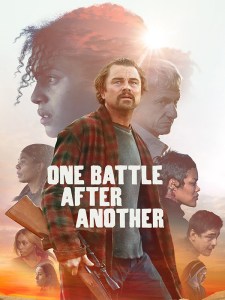 One Battle After Another
One Battle After Another
Wri/Dir: Paul Thomas Anderson (Licorice Pizza)
It’s a couple decades ago, somewhere in the American Southwest. An underground revolutionary faction, known as “The French 75”, is carrying out their latest plan: to liberate hundreds of undocumented workers from an ICE-type detention centre. Members of the group have memorized codes and passwords, and only use their nicknames.
Like JunglePussy and Mae West. Perfidia Beverley Hills (Teyana Taylor) is one of the organizers, and her lover Bob aka Rocket Man (Leonardo DiCaprio) is their fireworks expert. Over the course of the action that night, Perfidia, in a power move, forces their chief enemy, a hardboiled military officer named Col Lockjaw (Sean Penn) to have coercive sex with her. This leaves Lockjaw infatuated, and Perfidia pregnant. After the baby is born, Perfidia is captured by Lockjaw, and rats on her allies, in exchange for witness protection. But she manages to escape to Mexico, while Bob and their newborn-baby Willa hide out in a sanctuary city in California.
17 years later, Bob has become a useless pothead whose only responsibility is keeping his daughter Willa (Chase Infiniti) safe. She can never leave their house without carrying a tracking device, just in case the feds discover who Bob really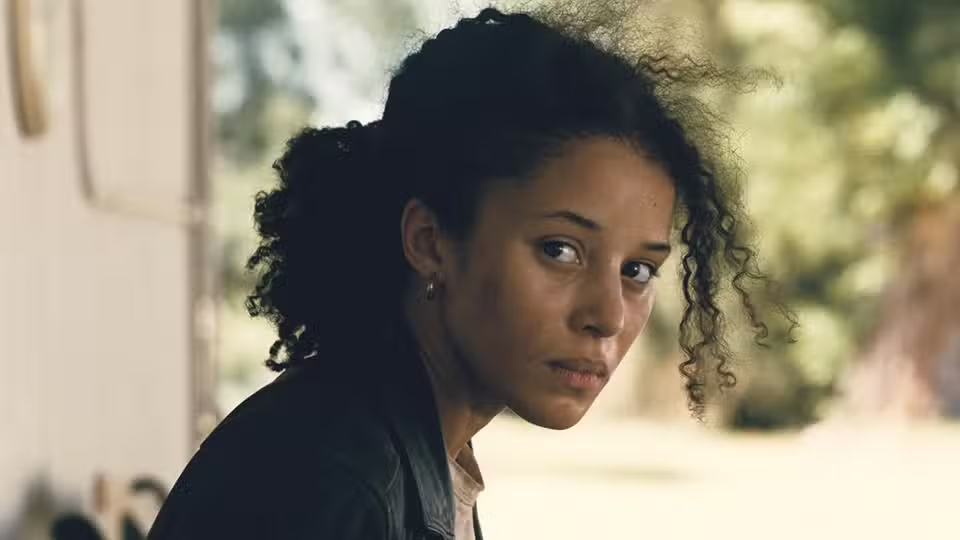 is: an underground leftist revolutionary. Willa studies martial arts with her sensei (Benecio Del Toro) and has a close-knit group of friends, named Bluto, Bobo, Riri and Autumn. They’re all getting ready for their high school dance. But little does she realize: her Mom, Perfidia — who she always thought was dead — is back in town; Col Lockjaw is planning a massive attack in order to capture his potential biological daughter; and Bob — following the capture of a key member of the French 75 — is called back to duty by the revolutionary group of his youth. What will become of this estranged family, their allies and their enemies?
is: an underground leftist revolutionary. Willa studies martial arts with her sensei (Benecio Del Toro) and has a close-knit group of friends, named Bluto, Bobo, Riri and Autumn. They’re all getting ready for their high school dance. But little does she realize: her Mom, Perfidia — who she always thought was dead — is back in town; Col Lockjaw is planning a massive attack in order to capture his potential biological daughter; and Bob — following the capture of a key member of the French 75 — is called back to duty by the revolutionary group of his youth. What will become of this estranged family, their allies and their enemies?
One Battle after Another is an amazingly complex and satirical action thriller about a tiny cadre of underground revolutionaries and their rivals the CIA, Ice and the military. Add to this an underground railroad that helps threatened migrants; The Christmas Adventurers — a white supremacist elite fraternity courting Lockjaw as a member — and a monastery full of bad-ass nuns with secret connections… and that’s only part of the complex plot of this movie.
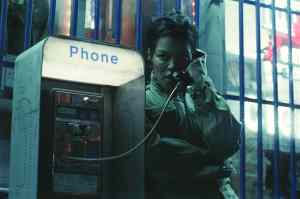 It’s inspired by Thomas Pynchon’s Vineland, but is set in the present, not the 1970s. Its dialogue is detailed and rich but always tongue in cheek, especially the outlandish names of characters and organizations. It’s also an out-and-out action thriller, with chases and close escapes, gun fights and explosions. Sean Penn acts like someone who has been chopped up and sewn back together, Teyana Taylor is perfection as the double/triple or quadruple agent; this is the first time I’ve ever seen Chase Infiniti, but she’s a powerhouse, and Leo Dicaprio — I’m no fan, but he’s so good in this movie, constantly beaten down but always surviving, like a Die Hard character but on the left. One of his best roles ever.
It’s inspired by Thomas Pynchon’s Vineland, but is set in the present, not the 1970s. Its dialogue is detailed and rich but always tongue in cheek, especially the outlandish names of characters and organizations. It’s also an out-and-out action thriller, with chases and close escapes, gun fights and explosions. Sean Penn acts like someone who has been chopped up and sewn back together, Teyana Taylor is perfection as the double/triple or quadruple agent; this is the first time I’ve ever seen Chase Infiniti, but she’s a powerhouse, and Leo Dicaprio — I’m no fan, but he’s so good in this movie, constantly beaten down but always surviving, like a Die Hard character but on the left. One of his best roles ever.
The film is beautifully shot in valleys and deserts, in a cinematographic style I’ve never seen before, like a camera mounted to the front of cars as they go up and down a hilly highway. Amazing! Soundtrack, costumes, art direction and the huge cast — many unforgettable roles I haven’t even mentioned yet — all so good.
One Battle After Another is an unforgettable movie. I recommend this one.
Dust Bunny and Silent Night Deadly Night both open in Toronto this weekend; And One Battle after another is still playing in some repertory cinemas; check your local listings.
This is Daniel Garber at the Movies, each Saturday morning, on CIUT 89.5 FM and on my website culturalmining.com.
Numerical titles. Films reviewed: Five Nights at Freddy’s 2, One More Shot
Hi, this is Daniel Garber at the Movies for culturalmining.com and CIUT 89.5 FM.
When you watch hundreds of movies a year, you start to notice certain trends, like avoid movies with numbers in their titles, especially sequels. But it doesn’t always work. Some people say The Godfather 2, Toy Story 3 or Rocky IV, are the best of their series.
So this week I’m looking at a couple more movies with numerical titles. There’s an Aussie who can travel in time using a swig of magic tequila, and an American who can bring automatons to life in a defunct pizzeria.
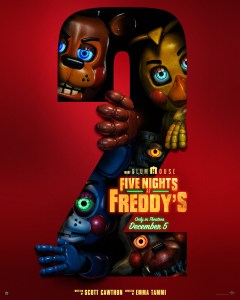 Five Nights at Freddy’s 2
Five Nights at Freddy’s 2
Dir: Emma Tammi
(Based on the game by Scott Cawthon)
It’s some time in the not-so-distant past, somewhere in Middle America. Mike (Josh Hutcherson) is a guy in his twenties who takes care of his 11-year-old sister Abby (Piper Rubio). Abby is lonely because no one at school believes the stories she tells. Mike is a lonely former security guard. He used to work in the ruins of former family restaurant Frank Fazbear’s Pizza. In its heyday, the place was wildly popular with children because of its giant, grinning animal-puppets who performed mechanically on a small stage. But the chain was shuttered for good 20 years ago when the animatronics went rogue and killed some kids. Then, one year ago, Mike and Abby barely escaped with their lives when the animals came back to life. Now, if Mike never sees another animatronic monster in his life, it will be too soon. But Abby holds a special affection for them; she considers them her only real friends. They talk to her, understand her problems and look out for her. And it’s hard to get away from them in this town, since everybody knows about them: there’s a festival devoted to Freddy Fazbear and a robotics contest both just around the corner. Meanwhile, Mike is flirting with Vanessa (Elizabeth Lail), a former cop who helped save Mike and Abby in last year’s bloodbath. She also happens to be the daughter of a deranged megalomaniacal 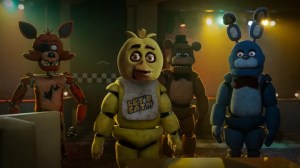 serial killer who built the original automatons, and who was personally responsible for the hideous crimes they committed. And it goes without saying that Vanessa hates her psychotic father.
serial killer who built the original automatons, and who was personally responsible for the hideous crimes they committed. And it goes without saying that Vanessa hates her psychotic father.
But despite all their precautions, Abby is hellbent on returning to the the crumbling restaurant, and in the mayhem that follows , the creatures are set loose to seek vengeance on their perceived enemies in the town. Can Mike, Abby and Vanessa fight them off and save the city? Or will the robots win out in the end?
Five Nights at Freddy’s 2 is the sequel to last years hit movie based on a video game by the same name, about an evil Chucky Cheese-style restaurant. It has some cool special effects, a few scary moments, especially involving a spooky villain known as the marionette. And I love the old 90s computers and the restaurant-gone-to-ruins motif. The main actors reprising their roles are all good. The problem with this movie is its meandering pointlessness, just a series of random episodes that have virtually no affect on what follows or precedes it. So an important character might be brutally murdered by animatronic creatures in one scene, and then 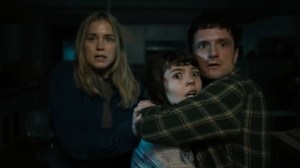 they drop out of the movie and are never referred to again.
they drop out of the movie and are never referred to again.
This happens over and over, which makes you wonder is their any coherence or point to this movie, other than chase scenes, brutal killings and jump scares? I went to a screening packed with fans dressed in cos-play cheering and shouting whenever a familiar character from the game appeared on the screen. They seemed to like it. But for the average viewer, like you or me, who’s never played the game, Five Nights at Freddy’s 2 is just another schlocky knock-off.
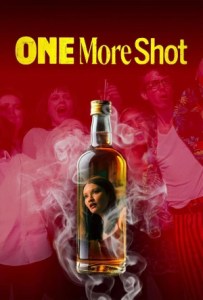 One More Shot
One More Shot
Dir: Nicholas Clifford
It’s New Year’s Eve, 1999, in Melbourne, Australia. Minnie (Emily Browning) is invited to a costume party to usher in the new millennium. She’s a doctor in her thirties, single and attractive. Many of her friends — and ex-lovers — will be at that party. She even has the words “party time” tattooed on her skin. But for some reason, she’s not in a partying mood. Her past relationships all went sour, and she’s been alone, and celibate, for far too long. At least her go-to sex buddy Joe (Sean Keenan) is back in town, so at the very least she’ll get some (Joe sports a matching tattoo which bonds them as sex partners forever.)
But when she arrives at the party, everything seems to go wrong. Joe has a new lover — an American bartender or “mixologist” as she calls herself (Aisha Dee) — and it looks serious. The hosts, Rodney and Pia (Ashley Zukerman, Pallavi Sharda) have a beautiful house and young kid, but they seem somehow at odds all the time; Flick and Max (Anna McGahan, Contessa Treffone), whose apartment she’s sharing want to  kick her out; and the only stranger at the party is a douchey OB-GYN (Hamish Michael) who is also a coke-head. And at midnight, everyone anticipates a computer crash due to the Y2K. Can things possibly get worse?
kick her out; and the only stranger at the party is a douchey OB-GYN (Hamish Michael) who is also a coke-head. And at midnight, everyone anticipates a computer crash due to the Y2K. Can things possibly get worse?
Oh yes they can. Minnie keeps messing everything up, and alienating all her friends just for a chance to get laid. But then she discovers she has the solution: the ancient bottle of Tequila she’s brought to the gathering. For some reason, each gulp brings her back again to the first time she tried it, right at the door to the party. Can she right all her wrongs and erase all her mistakes before the bottle is empty? Or will she just end up as a drooling hot mess on someone else’s couch?
One More Shot is a very light social comedy about Australian millennials at play. It’s a cute, somewhat funny riff on the Groundhog Day theme. Which makes it more than a little  repetitive. The cast is attractive and mildly clever, though I couldn’t really sympathize with any of them. But I do like time- travel comedies however they happen, and this version is pretty original. Kept me interested till the end.
repetitive. The cast is attractive and mildly clever, though I couldn’t really sympathize with any of them. But I do like time- travel comedies however they happen, and this version is pretty original. Kept me interested till the end.
While clearly no masterpiece, I enjoyed watching this one.
5 Nights at Freddy’s 2 opens this weekend in Toronto; check your local listings. One More Shot is now available on VOD.
This is Daniel Garber at the Movies, each Saturday morning, on CIUT 89.5 FM and on my website culturalmining.com.
 Hi, this is Daniel Garber at the Movies for culturalmining.com and CIUT 89.5 FM.
Hi, this is Daniel Garber at the Movies for culturalmining.com and CIUT 89.5 FM.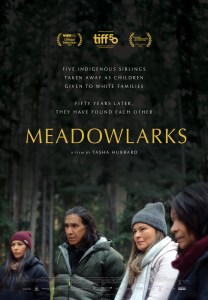 it’s the work of award-winning documentary filmmaker Tasha Hubbard, known for her powerful docs featuring indigenous subjects. Meadowlarks is her first narrative feature. I last interviewed Tasha in 2019 on this show about
it’s the work of award-winning documentary filmmaker Tasha Hubbard, known for her powerful docs featuring indigenous subjects. Meadowlarks is her first narrative feature. I last interviewed Tasha in 2019 on this show about
leave a comment